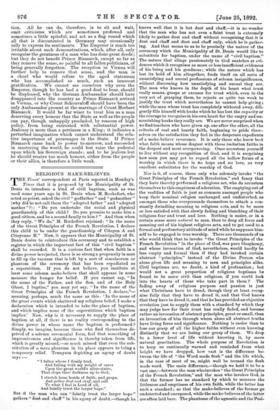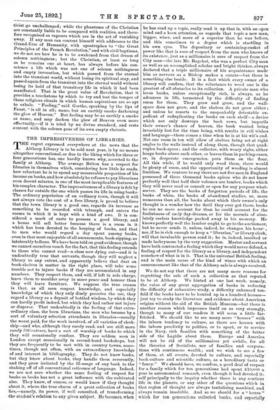RELIGIOUS MAKE-BELIEVES. T HE Times' correspondent at Paris reported in Monday's
Times that it is proposed by the Municipality of St. Denis to introduce a kind of civil baptism, such as was
used some years ago in St. Denis when M. Rochefort, who acted as priest, asked the civil " godfather " and " godmother "
(why did he not call them the " adopted father " and " adopted mother " ?) : " Do you undertake the social and physical
guardianship of this child ? Do you promise to make him a good citizen, and be a second family to him ? " And then when they reply, "We do," M. Rochefort rejoined : "In the name of the Great Principles of the French Revolution, I declare this child to be under the guardianship of Citoyen A and Citoyenne B." Now, it appears that the Municipality of St.
Denis desire to reintroduce this ceremony and to establish a register in which the important fact of this " civil baptism " shall be recorded. It is a curious fact that when faith in a divine power is rejected, there is so strong a propensity in man to fill up the vacuum that is left by a sort of simulacrum or phantom of the ceremony that has been repudiated as a superstition. If you do not believe, you institute at least some solemn make-believe that shall appease in some measure the hunger for belief. If you cannot say, "In the name of the Father, and the Son, and of the Holy Ghost, I baptise," you may yet say, " In the name of the Great Principles of the French Revolution, I declare,"— meaning, perhaps, much the same as this : In the name of the great events which shattered my religious belief, I make a declaration which is intended to take the place of baptism, and which implies none of the superstitions which baptism implies.' Now, why is it necessary to supply the place of baptism at all, if there is no reality corresponding to the divine power in whose name the baptism is performed ? Simply, we imagine, because those who find themselves de- prived of a solemn ceremonial form, feel that something of impressiveness and significance is thereby taken from lite, which is greatly missed,—so mach missed that even the sub- stitution of a mere phantom in its place appears to bring a temporary relief. Tennyson depicting an agony of doubt says :—
" I falter where I firmly trod, And falling with my weight of cares Upon the great world's altar-stairs, That slope thro' darkness up to God,
I stretch lame hands of faith, and grope, And gather dust and chaff, and call
To what I feel is Lord of all, _ And faintly trust the larger hope."
But if the man who can "faintly trust the larger hope" gathers " dust and chaff " in his agony of doubt,—though he knows well that it is but dust and chaff,—it is no wonder that the man who has not even a faint trust is extremely likely to gather dust and chaff without recognising that it is dust and chaff and dust and chaff only, which he is gather- ing. And that seems to us to be precisely the nature of the ceremony which the Municipality of St. Denis would like to substitute for baptism, under the name of " civil baptism." The nature that clings passionately to God snatches at evi- dences which it recognises as more or less insufficient evidences of his being and his goodness ; while the nature which has lost its hold of him altogether, feeds itself on all sorts of unsatisfying and unreal professions of solemn insignificance, without discerning how unsatisfying and unreal they are. The man who knows in the depth of his heart what trust really means, grasps at excuses for trust which, even in the very act of grasping them, he rejects as quite too weak to justify the trust which nevertheless he cannot help giving ; while the man whose trust has completely withered away, dili- gently fills himself with husks which he has lost the capacity or the courage to recognise in his own heart for the empty and un- nourishing husks they really are. We are never surprised when we find teachers who have given up, one after the other, all the criteria of real and hearty faith, beginning to pride them- selves on the satisfaction they feel in the desperate expedients of a make-believe reverence. It is only those who know best what faith means whose disgust with these imitation faiths is the deepest and most overpowering. Once accustom yourself to live without any recognition of God, and it is surprising how soon you may get to regard all the hollow forms of a worship in which there is no hope and no love, as very excellent substitutes for the worship of God.
Nor is it, of course, those only who solemnly invoke " the Great Principles of the French Revolution," and fancy that they have thereby performed a religious act, who do accustom themselves to this emptiness of adoration. The emptying out of the realities of faith is just as common amongst people who keep their nominal religion unchanged and undisturbed, as amongst those who overpersuade themselves to attach a con- stantly dwindling meaning to religious azts, and to be more or less satisfied with that slowly fading and blanching of their religious fear and trust and love. Nothing is easier, or in a certain sense more natural to man, than to drop all force and meaning out of his highest religious acts, and to get used to a formal and perfunctory attitude of mind while he supposes him- self to be engaged in true worship. There are thousands of us who would think that to invoke "the Great Principles of the French Revolution" in the place of God, was pure blasphemy, and whose invocation of God, nevertheless, would hardly be less empty and formal than if they had invoked certain abstract "principles," instead of the Divine Person who alone gives life and meaning to men and principles alike. Civil baptisms are, no doubt, a kind of profanation ; but would not a great proportion of religious baptisms be found to be more civil than religious, if you could look into the hearts of those who take part in them The fading away of religious purpose and passion is just what Christians have to dread, though they at least recog- nise fully that they have to dread it, and that God knows that they have to dread it, and that he has provided an objective revelation just to supply them with a standard by which they may judge how far their trust has really faded, and become rather an invocation of abstract principles, great or small, than an invocation of him through whom alone all abstract truths have living force and significance. Nothing is easier than to lose our grasp of all the higher faiths without even knowing distinctly that we are losing our grasp of them. We drop to a lower level of life without knowing it, by mere natural gravitation. The whole purpose of Revelation is to keep us continually warned and reminded from what height we have dropped, how vast is the difference be- tween the life of " the Word made flesh" and the life which, in the case of most of us, might well be termed the flesh made word. The main difference,—though we hold it to be a vast one,—between the man whoinvokes " the Great Principles of the French Revolution," and the man who invokes God, is that the former has no standard by which to measure the littleness and emptiness of his own faith, while the latter has such a standard ; so that the make-believes of the former go undetected and unexposed, while the make-believes of the latter are often laid bare. The phantoms of the agnostic and the Posi-
tivist go unchallenged; while the phantoms of the Christian are constantly liable to be compared with realities, and there- fore recognised as vapours which are in the act of vanishing away. If any man can content himself with addresses to the Grand-Etre of Humanity, with apostrophes to "the Great Principles of the French Revolution," and with civil baptisms, we do not see how he is to be awakened from that dream of solemn nothingness ; but the Christian, at least so long as he remains one at heart, has always before his con- science a life which was not one of solemn nothingness and empty invocation, but which passed from the eternal into the transient world, without losing its spiritual stay, and passed again from the transient into the eternal world without losing its hold of that transitory life in which it had been manifested. That is the great value of Revelation, that it provides a touchstone by which to try and teat the temper of those religions rituals in which human aspirations are so apt to exhale. " Feeling," said Goethe, speaking by the lips of Faust, " is all in all ; name, but an earthly smoke darkening the glow of Heaven." But feeling may be as earthly a smoke as name, and may darken the glow of Heaven even more effectually,—if it is tried by no divine standard, and rests Japntent with the solemn pose of its own empty rhetoric.



































 Previous page
Previous page